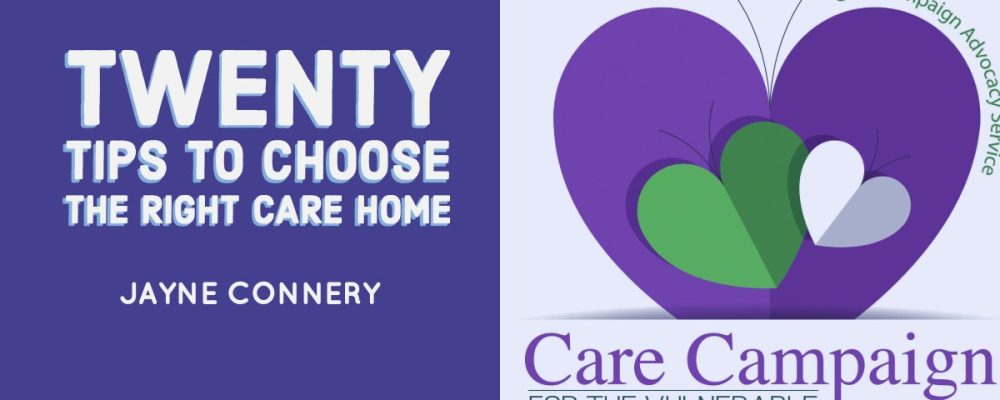
Jayne Connery is the founder of Care Campaign for the Vulnerable. Jayne is now championing for better transparency in care delivery after her experience with an immediate family member receiving care. Families and carers contact Care Campaign for support and guidance.
Care Campaign For The Vulnerable work includes visiting many care homes promoting CCTV safety monitoring in communal areas and helping support families who say are affected by poor care.
Jayne’s twenty tips on choosing the right care home for your loved ones
We know the key points to look out for when needing to choose a care home that will offer the best possible care and understanding to your loved one’s health and emotional well being – however, the final decision must be with the family and or health agencies.
Here are a few pointers that should help you decide as a family. Please ensure you take further advice by contacting professional authorities.
1. Before you even begin to choose a care home, you will need to decide on the right type of care your loved one will need at this moment but be mindful his /her care needs could change. Talk to his/her health care professional and take advice on how to pay for your loved ones care. You can find this information here
2. The internet is your ideal place to get the best information regarding the type of care home available in your area.
3. Choose more than one or two. It is always useful to visit more than a couple.
4. Do not call before your first visit.
5. When you walk into the care home first check if it has safety monitoring on the exits and turns up unannounced – if you call beforehand, you can be sure they will prepare. On a positive note, care homes can be very busy and turning up without an appointment can be disruptive for them to provide care for their existing service users. Making a viewing when the Manager is around will give you all the answers you need.
6. Entrances – Does it smell bad? If it does this could show they are not attending to vulnerable clients as quickly as they should be and this should raise alarm bells. A clean home is a reflection of excellent management.
7. Look to see if the armchairs are in a circle and try and see if there are any activities and interaction by care staff. Ask if there is an activities coordinator – if not, this usually is frowned upon by family members if residents are sitting around with nothing to do. If there is no activity coordinator as such, will rest of the staff get protected time to do meaningful activities with the service users?
8. I know when families contact Care Campaign For The Vulnerable they want to assure that loved ones are safeguarded – check for safety monitoring in communal areas. If your loved one should have an accident or an incident happen – having transparency is vital in receiving answers should it occur in these areas?
9. Check the care homes comments /visitors book. There should be a comments book for families. If not, ask why?
10. Ask regarding care home agency staff? How often do they use agency staff?
11. Do residents get taken out weekly/Will they cater for your loved one’s diet? Ask to look in the kitchen. Talk to the chef regarding the types of foods they offer.
12. Can you visit any time day or night?
13. Could you have safety monitoring in your loved one’s room? ( if your loved one cannot make this decision)
14. Are staff trained in the classroom or just online? If your loved one has dementia, it’s essential carers understand the complexities of this condition can bring and therefore are staff equipped to cope?
15. If your loved one has ‘challenging behaviours’ re dementia, ‘i.e. shouts, swears, distressed during certain times, are they trained to understand this?
16. Check out the Care Home’s CQC report/rating before you make your decision. Although it is not guaranteed all the time, the risks will be less if you choose a care home which is rated as outstanding by CQC.
17. Trust your gut instinct. If you wouldn’t want to live there why should your loved one?
18. Remember an excellent care home with professional management will want to be open and transparent and will be eager to work with you as a family. Show them you want to be involved and make them aware you are the first point of call should anything happen to your loved one under their care.
19. A good care home manager will be eager to ask questions about your loved one regarding likes/dislikes etc. Ask if they hold regular family meetings to update you?
20. Visiting a care home for your loved one may stir up feelings of guilt, sadness and failure especially if you can no longer manage to care for them. A good manager will recognise this and offer you reassurance.
If you want to explore and support Jayne’s campaign, visit the website here.





